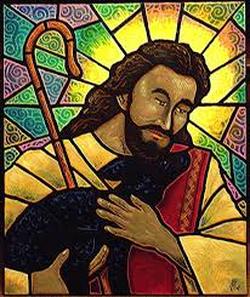 “I am the good shepherd. I know my own and my own know me, just as the Father knows me and I know the Father. And I lay down my life for the sheep.” John 10:14-15 Sermon Snapshot from Sunday, April 26, 2015 “You don’t know who I am! You don’t know what I‘ve done!” Those were the first words said to me by a hospice patient after I introduced myself to him as the chaplain. I was a little taken aback, but I smiled, leaned in and said as honestly as I could, “Yes, you’re right. I don’t know you or what you’ve done. But, I am willing to hear your story, if you are willing to tell me …” There is a deep yearning within us all to be known. Yet there is also a very real and present fear of actually becoming known to another person because we’ve opened ourselves up to feeling rejected and ridiculed. It’s quite a risk. Can the other be trusted? Vulnerability is the courageous step to risk being known. We love knowing things! Apparently, psychologists tell us that this desire to know things is our attempt to control and reduce our distress and/or anxiety. Ironically, this anxiousness comes largely not because we don’t know enough things, but because we are not known by others. The modern ethos tells us to value independence and personal choice without acknowledging any need for one another. Certainly, these are important things to value as authentic people, but we are also interdependent as well. The biblical model is one of communal significance that leads us away from isolation and alienation. In Genesis, Adam was given a “helper”, but not one who would wash his clothes or cook his meals, but in the Hebrew the idea is more like a “mirror.” Through relationship with another, he would be better able to know himself! Doesn’t that ring true? When you open yourself to another person, you learn more about yourself in the process. The field of Interpersonal Neuro Biology is now catching up with this biblical principle in exploring how we learn about ourselves by seeing ourselves through someone else’s eyes. Later in Genesis, after Adam and Eve had eaten the fruit, they go and hide and cloth themselves for they “realized that they were naked.” The power of this passage isn’t that it happened at some point in the pre-historic past, but that it happens every day! When someone else discovers “who we are” or “what we’ve done”, we feel exposed and attempt to cover ourselves. We are all like that dying man, who unleashed upon me for my ignorance of who he was and what he did. We wanted to be known, but didn’t know if he could trust me. He did make the courageous move to open up and share about the horrors he saw and participated in during WWII. He had never talked with another soul, outside of his regiment, about those stories. Jesus knew his pain. Jesus knows your pain, knows your sorrow, knows all those bitter secrets that frame your existence and he loves you anyway. How do I know? Because Jesus said, “I lay down my life for the sheep.” He knows you and loves you. He knows you and forgives you. The question remains: Can you forgive yourself? Can you stop hiding in the garden and take the courageous leap of faith to be known and know the forgiving grace of God?
0 Comments
Leave a Reply. |
About TimI'm a follower of Christ, husband, father, friend, pastor, story teller, asker of questions, inspired by biblical narratives, social justice advocate, sports enthusiast, drinker of over priced coffee and general seeker of God's redemptive possibilities. Yeah, that about covers it. (If you discover something else, let me know!) Archives
May 2022
Categories |
|
First Baptist Church of White Plains
456 North Street White Plains, NY 10605 |
|

 RSS Feed
RSS Feed